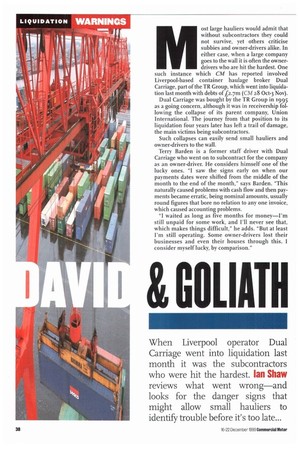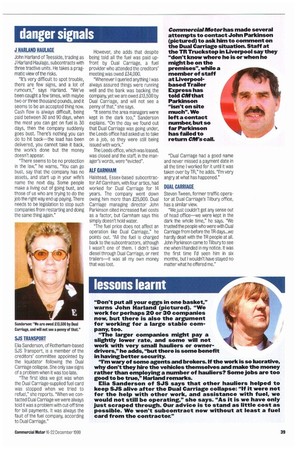When Liverpool operator Dual Carriage went into liquidation last month
Page 40

Page 41

If you've noticed an error in this article please click here to report it so we can fix it.
it was the subcontractors who were hit the hardest. Ian Shaw reviews what went wrong—and looks for the danger signs that might allow small hauliers to identify trouble before it's too late... IVIost large hauliers would admit that without subcontractors they could not survive, yet others criticise subbies and owner-drivers alike. In either case, when a large company goes to the wall it is often the ownerdrivers who are hit the hardest. One such instance which CM has reported involved Liverpool-based container haulage broker Dual Carriage, part of the TR Group, which went into liquidation last month with debts of f2.7m (CM 28 Oct-3 Nov).
Dual Carriage was bought by the TR Group in T995 as a going concern, although it was in receivership following the collapse of its parent company, Union International. The journey from that position to its liquidation four years later has left a trail of damage, the main victims being subcontractors.
Such collapses can easily send small hauliers and owner-drivers to the wall.
Terry Barden is a former staff driver with Dual Carriage who went on to subcontract for the company as an owner-driver. He considers himself one of the lucky ones. "I saw the signs early on when our payments dates were shifted from the middle of the month to the end of the month," says Barden. "This naturally caused problems with cash flow and then payments became erratic, being nominal amounts, usually round figures that bore no relation to any one invoice, which caused accounting problems.
"I waited as long as five months for money—I'm still unpaid for some work, and I'll never see that, which makes things difficult," he adds. "But at least I'm still operating. Some owner-drivers lost their businesses and even their houses through this. I consider myself lucky, by comparison."
danger signals
J HARLAND HAULAGE John Harland of Teesside, trading as J Harland Haulage, subcontracts with three tractive units. He takes a pragmatic view of the risks.
"It's very difficult to spot trouble, there are few signs, and a lot of rumours," says Harland. "We've been caught a few times, with maybe two or three thousand pounds, and it seems to be an accepted thing now. Cash flow is always difficult, being paid between 30 and 90 days, when the most you can get on fuel is 30 days, then the company suddenly goes bust. There's nothing you can do to hit back—the load has been delivered, you cannot take it back, the work's done but the money doesn't appear.
"There seems to be no protection in the law," he warns, "You can go bust, say that the company has no assets, and start up in your wife's name the next day. Some people make a living out of going bust, and those of us who are trying to do the job the right way end up paying. There needs to be legislation to stop such companies from restarting and doing the same thing again."
WS TRANSPORT
Ella Sanderson, of Rotherham-based SJS Transport, is a member of the creditors' committee appointed by the liquidator following the Dual Carriage collapse. She only saw signs of a problem when it was too late.
"The first Idea we got was when the Dual Carriage-supplied fuel card was stopped when we tried to refuel," she reports. "When we contacted Dual Carriage we were always told it was a problem with cut-off time for bill payments. It was always the fault of the fuel company, according to Dual Carriage." However, she adds that despite being told all the fuel was paid upfront by Dual Carriage, a fuel provider who attended the creditors' meeting was owed £34,000.
"Whenever I queried anything I was always assured things were running well and the bank was backing the company, yet we are owed 213,500 by Dual Carriage, and will not see a penny of that," she says.
"It seems the area managers were kept in the dark too," Sanderson explains. "On the day we found out that Dual Carriage was going under, the Leeds office had asked us to take on a job, so they were still being issued with work."
The Leeds office, which was leased, was closed and the staff, in the manager's words, were "evicted".
ALF GARNHAM Halstead, Essex-based subcontractor Alf Garnham, with four artics, had worked for Dual Carriage for 14 years. The company went down owing him more than 125,000. Dual Carriage managing director John Parkinson cited increased fuel costs as a factor, but Garn ham says this simply doesn't hold water.
"The fuel price does not affect an operation like Dual Carriage," he points out. "All the fuel is charged back to the subcontractors, although I wasn't one of them. I didn't take diesel through Dual Carriage, or rent trailers—it was all my own money that was lost. "Dual Carriage had a good name and never missed a payment date in all the time I worked for it until it was taken over by TR," he adds. "I'm very angry at what has happened."
DUAL CARRIAGE
Steven Tween, former traffic operator at Dual Carriage's Tilbury office, has a similar view.
"We just couldn't get any sense out of head office—we were kept in the dark the whole time," he says. "We trusted the people who were with Dual Carriage from before the TR days...we hardly dealt with the TR people at all. John Parkinson came to Tilbury to see me when I handed in my notice. It was the first time I'd seen him in six months, but I wouldn't have stayed no matter what he offered me."
"Don't put all your eggs in one basket," warns John Harland (pictured). "We work for perhaps 20 or 30 companies now, but there is also the argument for working for a large stable company, too.
"The larger companies might pay a slightly lower rate, and some will not work with very small hauliers or ownerdrivers," he adds, "but there is some benefit in having better security.
"I'm wary of some agents and brokers. If the work is so lucrative, why don't they hire the vehicles themselves and make the money rather than employing a number of hauliers? Some jobs are too good to be true," Harland remarks.
Ella Sanderson of SJS says that other hauliers helped to keep SJS alive after the Dual Carriage collapse: "If it were not for the help with other work, and assistance with fuel, we would not still be operating," she says. "As it is we have only just scraped through. Our advice is to stand as little cost as possible. We won't subcontract now without at least a fuel card from the contractor." Commorcial Motor has made several attempts to contact John Parkinson (pictured) to ask him to comment on the Dual Carriage situation. Staff at the TR Truckstop in Liverpool say they "don't know where he is or when he might be on the premises", while a member of staff at Liverpoolbased Trailer Express has told CMthat Parkinson "isn't on site much". We left a contact number, but so far Parkinson has failed to return CM'scall.
































































































